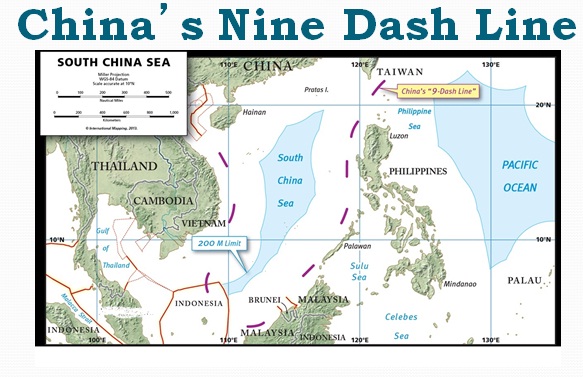
By Ellen T. Tordesillas, VERA Files
Despite Chinese requests to delay it, the Philippines is filing on March 30 its memorandum challenging before the United Nations China’s territorial claims over the South China Sea.
The memorandum, called a Memorial in international law, will be filed with the Arbitral Tribunal of the United Nations Convention on the Law of the Sea (UNCLOS) at The Hague in the Netherlands, contesting China’s 9-dash line territorial rule.
Under the 9-dash line rule, China claims almost the whole of the South China Sea as part of its territory, but the Philippines and three other Southeast Asian nations are staking various claims to parts of the area.
Sources said the Chinese government had asked President Aquino through back channels to wait a little longer before filing the Memorial.
A delay in the filing would be seen as an indication of Philippine willingness to improve ties with China, a source quoted a Chinese official as saying.
China has informed the Philippines it will reciprocate accordingly, and will withdraw its ships from Bajo de Masinloc (Panatag Shoal to Filipinos, Huangyan island to the Chinese) to restore the relationship to where it was before April 8, 2012.
The source said China considers the suit, filed in January 2013, as an obstacle to improving its ties with the Philippines.
“We don’t expect the Philippines to withdraw the suit because we understand that national pride is at stake,” a Chinese official reportedly told counterparts in the Philippines, the source said. “But we hope you can delay it.”
The Chinese official reportedly added, “In our culture, bringing someone to court is like assaulting him.”
China also said that if the Philippines delays filing the claim, it would not establish a South China Sea Air Defense Identification Zone (ADIZ) like it did in the East China Sea which included air space over the Japanese-controlled Senkaku islands.
An ADIZ is airspace in which the country that imposed it requires identification, location and control over civil aircraft passing through that zone, in the interest of national security.
China also said once the “obstacle” is removed, the Philippines can expect increased economic opportunities, including the promotion of the Philippines as a tourist destination.
Philippine-China ties have been strained since April 8, 2012, when the lone Philippine warship BRP Gregorio del Pilar apprehended Chinese fishing vessels in the Bajo de Masinloc area, 124 nautical miles off Zambales, prompting China to send Chinese Marine Surveillance (CMS) ships to the area.
At the height of the 57-day standoff, more than 80 Chinese vessels surrounded two Philippine ships—one from the Philippine Coast Guard and the other from the Bureau of Fisheries and Aquatic Resources—that had replaced the Gregorio del Pilar.
On June 4, 2012, the Philippines pulled out the two ships and never sent any back to the area but China kept three there.
On Jan. 27, 2014, the Armed Forces of the Philippines reported that Filipino fishermen were sprayed with water when they got near the Chinese Coast Guard ships.

In a media briefing at the UP Law Center last month, Jardeleza disclosed that the Arbitral Tribunal acceded to the Philippine request not to separate the jurisdiction aspect from the merits of the case.
“Jurisdiction and merits will be discussed in the Memorial together,” Jardeleza said, adding that this will give the Philippines the “tactical advantage.”
“We are very strong on the merits and by discussing the merits more and more you gain an advantage hoping to convince the tribunal that they should take the case and rule that they have jurisdiction,” he said.
Legal experts are concerned that the UNCLOS Arbitral Tribunal would consider the issues raised by the Philippines as territorial disputes. The Tribunal decides only on disputes on overlapping maritime zones, while the International Court of Justice (ICJ) decides on territorial disputes.
In the ICJ, however, both parties would have to agree to submit the dispute to the Court. China has refused to participate in the case filed by the Philippines.
Justice Antonio T. Carpio, in a speech before the Philippine Women’s Judges Association early this month said, “The Philippines’ arbitration case against China is solely a maritime dispute and does not involve any territorial dispute.”
Carpio added, “The Philippines is asking the tribunal if China’s 9-dash line can negate the Philippines’ Exclusive Economic Zone (EEZ) as guaranteed under UNCLOS. The Philippines is also asking the tribunal if certain rocks above water at high tide, like Scarborough Shoal, generate a 200 nautical mile (NM) EEZ or only a 12 NM territorial sea. The Philippines is further asking the tribunal if China can appropriate low-tide elevations (LTEs), like Mischief Reef and Subi Reef, within the Philippines’ EEZ. These disputes involve the interpretation or application of the provisions of UNCLOS. “
Jardeleza said the Philippines in the Memorial will not ask the court to say who owns Panatag shoal. “We are arguing that they are within our Economic Exclusive Zone and therefore under the rules of UNCLOS we have exclusive rights to fish within that area,” he said.
Jardeleza summed up the Philippine line of argument in the Memorial to convince the Tribunal that it has jurisdiction: “Our claim is a very narrow one, land dominates the sea. This is not a case about land; this is a case about the maritime waters which is perfectly under UNCLOS.”
Jardeleza said he expects the Court to give China time to respond before it starts the hearing. It may call for oral arguments or ocular inspection. He said it may take the Tribunal three years to decide from the date of the filing in January 2013.
The Arbitral Court panel of judges is headed by Thomas Mensah from Ghana. Members are Rudiger Wolfrum from Germany, Stanislaw Pawlak from Poland, Jean-Pierre Cot from France, Alfred Soons from The Netherlands.
The Philippine legal team is headed by Paul Reichler, a Washington-based lawyer from the Foley Hoag law firm, British law professors Philippe Sands and Alan Boyle, and Bernard Oxman from the University of Miami’s Law school.
Jardeleza said the public declarations of Southeast Asian countries, the United States, and even the European Union against the 9-dash line strengthen the Philippine case.
“We are a small country but we plan to win big in this,” Jardeleza said.
(VERA Files is put out by veteran journalists taking a deeper look at current issues. Vera is Latin for truth.)
I go with the filing on March 30. Delay is no use except for China’s tactics that suit their interests.
Looks like China is anxious, haha!
why delay when we know how ruthless china is re territorial disputes especially with japan.
China won’t compromise with Japan on “sovereignty”: China Foreign Minister
http://www.presstv.ir/detail/2014/03/08/353798/china-wont-compromise-on-sovereignty/
http://www.nytimes.com/2014/03/09/world/asia/china.html
Add Japan to the list of longtime US allies who think America’s international stance these days is disconcertingly
http://www.the-american-interest.com/blog/2014/02/19/abe-adviser-pillories-us-on-youtube/
War of the Past:. China ups military spending & vows to not let Japan “reverse the course of history”.
http://www.the-american-interest.com/blog/2014/03/09/chinese-premier-history-will-not-be-reversed/
Thank you for this excellent briefing on the behind-the-scenes goings on. I found particularly insightful the Chinese view that a court filing is akin to assault. I believe China needs to adapt her thinking to the ways of the greater law-abiding world, not expect the world to adapt to her outdated cultural norms.
I hope the Solicitor General’s prediction is true, that this is a big win for the Philippines.
Proceed with the filing. Resist Chinese bullying & dilatory tactics.
China waging political warfare against US as to drive the U.S. military out of Asia according to Pentagon study.
http://freebeacon.com/national-security/warfare-three-ways/
@jonymarzan #6. Interesting. I have not read that study but I rather think China would be a lot more effective in driving the US out by solidifying friendships and trade relations with neighboring states and eliminating the need for US war machines. China instead chooses to steal the neighbors’ property and take every opportunity to bully them (as was done this past couple of weeks against Malaysia on the airplane tragedy). So naturally the neighbors ask a friendlier warmonger to back them.
why delay when we know how ruthless china is re territorial disputes especially with japan.
China won’t compromise with Japan on “sovereignty”: China Foreign Minister
http://www.presstv.ir/detail/2014/03/08/353798/china-wont-compromise-on-sovereignty/
What China said is clear: China’s wont’t compromise with Japan. But China is willing to compromise and work with the Phil. See the difference? I’ve said this several time and am saying this again…China hates Japan a lot more than the Phil. If there’s going to be a war in the Asia-Pacific, it’s going to begin with China and Japan.
you’re missing the point mannie. china wont compromise with the PHL either. maybe japan should go to the UN courts too!
Sorry if I missed your point. But between Japan and the Phil, I know China would bend a little bit to accommodate the Phil.
Tit for Tat. We give up two shoals we control outside our EEZ, China gives up two inside our eez.
What if the NBN-ZTE deal pushed through, will the Philippines take China to court?
Is compromise possible?
http://www.cfr.org/asia-and-pacific/chinas-maritime-disputes/p31345?cid=otr-marketing_use-china_sea_InfoGuide#!/
#13 It depends on who the current President is. If he’s identified or allied with GMA, no. But Pnoy is her political foe.
I wonder if anyone has watched the movie “City of Life & Death”, a documented true story about Japan’s attack and occupation of Nanking, China. Around 300,000 Chinese were killed on this city of Nanking alone. The atrocities committed by the Japanese on Chinese have caused a deep scare on China until this day. That’s one possible reason why China would most likely go to war with Japan rather than with the Philippines the latter of which also suffered under the hands of the Japanese Imperial Army.
@ #13
Mahirap mamangka sa ganitong sitwasyon. Kung nagkaroon ng kasunduan, maaaring ibitin ang proyekto… ang danyos ay maaring sa parte ng ‘Pinas.
“………..The Chinese official reportedly added, “In our culture, bringing someone to court is like assaulting him.”
China also said that if the Philippines delays filing the claim, it would not establish a South China Sea Air Defense Identification Zone (ADIZ) like it did in the East China Sea which included air space over the Japanese-controlled Senkaku islands…….”
should the chinese consider the recent action of the philippines as a consequence of their action in encroaching parts of its (philippines) territories then they would have also consider a second thought of what might be its outcome. and this was it!
the problem with china is IT DEEPLY became salivated on the suspected natural gas and oil deposits still unverified sitting under the contested sites. thanks to the devil woman who once ruled the country.
they should also understand that it is NOT only the national pride they stepped when they tried to take away part of our territory but also our dignity as a souvereign nation and people.
never mind whether we can depend on our neighbors in this time of provocation OR NOT. just go on and continue modernizing our armed forces, fortify our shorelines and train able bodied and freedom loving citizenry.